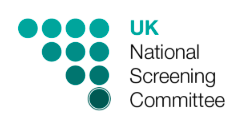UK NSC annual call: how to submit a proposal
Updated 8 October 2024
This guidance explains how to submit topics to the UK National Screening Committee (UK NSC) to consider under the annual call for topics.
Topic proposals can be for population, targeted or stratified screening programmes.
They can include:
- proposals for new topics
- early updates of topics that the UK NSC has considered within the past 3 years
- proposals to modify or cease existing screening programmes.
All submissions should be made during the 3-month annual call for topics period.
Check the UK NSC’s list of recommendations to determine the current status, if any, of your topic.
1. Before submission
Consider whether you are:
- proposing a new topic
- requesting an early update for a topic
- suggesting a modification to, or ceasing of, an existing screening programme
For guidance on writing proposals, please refer to section 2 below and the annual call submission example.
1.1 New topic proposal
To submit a proposal for a new screening topic, you will need to email the following information to the UK NSC evidence team at [email protected]:
- name of topic
- type of screening proposed: population, targeted or stratified
- your name
- your organisation, if any
- your email address
- summary of your proposal and why the topic is within the remit of the UK NSC (up to 200 words)
- a summary of the condition, the test and the treatment (up to 500 words)
- any evidence showing benefit from screening, ideally from a randomised controlled trial (RCT)
- up to 10 references to support your application
- a flowchart (if possible)
1.2 Early topic update proposal
Before submitting early update of a topic that the UK NSC has considered within the past 3 years, please check the UK NSC’s list of recommendations to make sure a review has not already started.
To submit a proposal for an early topic update, you will need to email the following information to the UK NSC evidence team at [email protected]:
- name of topic
- your name
- your organisation, if any
- your email address
- summary of your proposal, including how it would affect the recommendation, and any new evidence that justifies why the UK NSC should look at this topic again (up to 500 words)
- up to 10 references to support your application
Your justification will need to highlight how the UK NSC criteria would be altered by the new evidence you have submitted and how the proposal would affect the overall recommendation.
1.3 Programme modification proposal
To submit a proposal for a modification to an existing screening programme, you will need to email the following information to the UK NSC evidence team at [email protected]:
- the programme your proposal relates to
- your name
- your organisation, if any
- your email address
- an explanation of the modification you are suggesting (up to 200 words)
- a summary of the impact this would have on the whole screening pathway in up to 500 words (this could include, for example, identifying new types of abnormality or incidental findings, or revised cost effectiveness evidence)
- up to 10 references to support your application
- 2 flowcharts, if possible, one for the existing programme and the other showing the changes proposed
2. Writing your proposal
You should write your proposal so it can be understood by someone who is not an expert in the topic area. Try to avoid abbreviations and acronyms, or define them when first used. Try to avoid technical jargon.
Published peer reviewed evidence is essential to support the submission. All information provided should be based on the referenced publications. References must be papers published in peer reviewed journals, specifying authors, title, journal, issue number and year of publication.
Submissions without strong supporting references will need to present a compelling case on the basis of more limited evidence.
Levels of evidence that make strong recommendations include:
- systematic reviews
- randomised controlled trials (RCTs)
- population-based studies
- test accuracy studies with consecutively enrolled or randomly selected samples from the target population
The UK NSC understands that RCTs are not available for some rare conditions. The Critical Appraisal Skills Programme (CASP) discusses different evidence types, and offers checklists to appraise them.
You should provide balanced, impartial information, highlighting both the benefits and harms of screening. If necessary, highlight gaps and limitations in current evidence.
If possible, where requested, include a flowchart as a graphical representation of the screening pathway from identifying the eligible population through to the outcomes of the screening programme. See the flowchart in the annual call submission example.
Please include a flowchart if you are able to. A flowchart should include the estimated number of people:
- accepting / declining screening
- testing positive / negative / uncertain
- receiving treatment
- helped / unaffected / harmed by the programme
Please note, submissions will not be rejected on the basis of flowcharts not being included.
3. Submit your proposal
Send your completed recommendation to [email protected].
The Fetal, Maternal, Child Health (FMCH) expert group and the Adult Reference Group (ARG) will propose next steps for submissions and a final decision will be made in collaboration with the UK NSC. The selected topics will be included in the next work plan, which will be agreed with the chief medical officers (CMOs) from the 4 countries.
Depending on the number of submissions received, we will aim to get back to you shortly after the first 2025 meeting of the relevant expert group to update you on your proposal’s progress. The FMCH meets on 23 January 2025 and the ARG meets on 20 February 2025.

